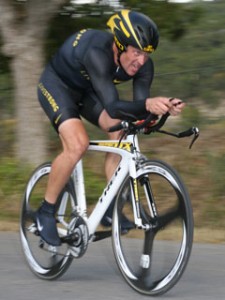
Lance Armstrong is arguably the most profound sporting story ever told. Anyone that can fight cancer the way he did is undoubtedly an inspiration, but you add his champion feats as a cyclist post-illness, and you are presented with someone who appeared superhuman.
The combination of remarkable determination, tactical nous and physical power won Armstrong seven consecutive Tour de France titles between 1999 and 2005, the most by any cyclist in the 109-year history of the prestigious race.
But devastatingly, a fourth factor has been added to the list of reasons for his success and now inglorious demise – drugs.
Outstanding cycling achievements inevitably lead to claims of drug-use. The cynical thought processes go hand-in-hand with any efforts that exceed expectation, or are just indeed exceptional.
Instead of celebrating greatness, we tear it down, pull it apart, analyse it. Even if the evidence is clean, we often muddy the waters by acknowledging the effort with hidden or sometimes open trepidation.
But the sad reality is that while those that are clean must face unfair stigmas, the skepticism is justifiable. Convicted drug cheats have been a regular occurence in recent years.
In 2006, American Floyd Landis won the Tour de France, only to have his title stripped after a positive urine test for doping. He vehemently proclaimed his innocence until 2010, when he not only admitted to doping but also suggested that Armstrong, a US Postal teammate, was doping too.
Two-time tour winner Alberto Contador had his 2010 victory removed in one of the more controversial cases of alleged drug taking. The Spaniard blamed contaminated meat for traces of clenbuterol, an amine used to assist breathing.
The amount of the substance raised questions over its capacity and intent to enhance performance, prompting many to defend Contador. However, suspicion surrounding the food contamination theory led to a guilty verdict.
Other high profile names, such as Frank Schleck , Jan Ullrich, Ivan Basso, Alexander Vinokourov, Michael Rasmussen and many more have also been suspended due to failed drug tests since Armstrong’s first retirement in 2005.
Queries surrounding the legitimacy of Armstrong’s brilliance have forever shadowed him. Anti-doping agencies WADA and USADA’s crusade to take down their white whale has been raging for well over a decade, and it reached its crescendo last week when Armstrong finally surrendered to the chase.
By opting to discontinue his battle against doping charges, Armstrong has been found guilty of using performance-enhancing substances, according to USADA.
‘USADA announced today that Lance Armstrong has chosen not to move forward with the independent arbitration process and as a result has received a lifetime period of ineligibility and disqualification of all competitive results from August 1, 1998 through the present,’ USADA said in a statement on Saturday.
Consequently, Armstrong has lost all seven of his Tour de France titles.
But there is an important point that may have been lost in the startling turn of events – Armstrong still hasn’t said he is guilty.
Stopping the fight, while out of character and interpreted as a guilty conscience, indicates his belief that it is a contest that can only yield one outcome.
‘If I thought for one moment that by participating in USADA’s process, I could confront these allegations in a fair setting and – once and for all – put these charges to rest, I would jump at the chance. But I refuse to participate in a process that is so one-sided and unfair,’ Armstrong said in his official statement.
With all this in mind, the media and public reaction to Armstrong’s case has been fascinating.
Cycling has uncovered many drug cheats in the past. Widely disgraced and jeered, the reputations of these athletes have been irreversibly tainted. Yet with Armstrong, there is a sense of hesitation.
Many people, myself included, don’t know who or what to believe.
That’s not to say that there aren’t people out there who agree with the move to disqualify Armstrong and stamp his papers as a drug cheat. The point is, it feels as though cycling’s messiah has rightly or wrongly been given some latitude.
Sally Jenkins, co-author of Armstrong’s books ‘It’s Not About The Bike’ and ‘Every Second Counts,’ slammed USADA’s motives and processes in her piece for the Washington Post.
Stating her uncertainty as to whether Armstrong did or didn’t use drugs, her arguments in support of him largely stem from the manner in which the investigation and findings have taken place.
It is a view that seems to be broadly shared.
Perhaps this is why despite USADA’s decision, there has been a reluctance to completely push Armstrong off his pedestal.
An area not up for debate is that Armstrong has provided hope for those struggling against adversity, with his conquer of cancer earning him as much respect as his actions in the French Alps.
Regardless of whether you consider him to be innocent or guilty, there are no winners out of the Armstrong verdict.
Either the legacy of one of the world’s greatest athletes has been incorrectly tarnished, or one of the world’s greatest athletes was built on fraudulent grounds.
Paul Bastin is a third-year Bachelor of Media Studies student at La Trobe University. He is the current deputy sports editor for upstart. You can follow him on Twitter: @paulbastin10.






